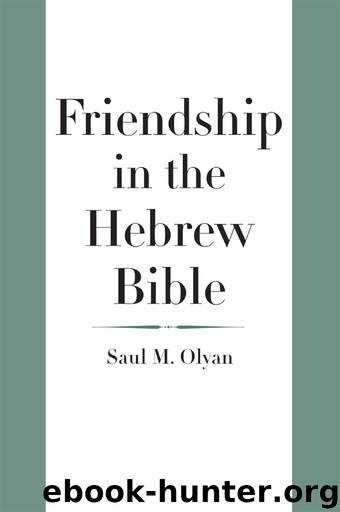Friendship in the Hebrew Bible by Saul M. Olyan

Author:Saul M. Olyan [Olyan, Saul M.]
Language: eng
Format: epub
ISBN: 9780300182682
Publisher: Yale University Press
Published: 2016-01-15T07:00:00+00:00
Conclusion
I begin my concluding remarks with a comparison of the representation of friendship in a number of distinct biblical literary types. Friendship is portrayed in the Psalms, particularly those of individual complaint; in legal materials such as Deut 13:7; in non-psalmic poetic texts such as “David’s Lament over Saul and Jonathan” (2 Sam 1:26); in prophetic passages such as Jer 9:3 and Mic 7:5–6; in prose narratives such as the stories of David and Jonathan, Ruth and Naomi, Job and his three comforters, Amnon, Absalom, and Jonadab, and Jephthah’s daughter and her companions; in pre-Hellenistic wisdom collections—both traditional and skeptical—such as Proverbs and the poetic sections of the book of Job; and in the Hellenistic wisdom collection Ben Sira. Friendship is represented both in biblical poetry and in prose narrative. Some of the texts of interest to us may be dated with confidence (e.g., Ben Sira, to the second century BCE), but most are difficult if not impossible to date. Ben Sira is not infrequently dependent on earlier biblical texts (both wisdom—traditional and skeptical—and nonwisdom); other texts in our purview display little or no evidence of dependence on earlier materials. Our texts sometimes share vocabulary, idioms, and ideas; sometimes they do not. The friends portrayed range from flat, one-dimensional types without any individuality to complex, strikingly singular people who may be conflicted and whose behavior is not necessarily consistent or predictable. We can chart the characteristics of friendship shared in common across literary types and bring the differences among those types into relief. In order to get a sense of the configurations of vocabulary, idioms, ideas, and portrayals pertaining to friendship across our sources, I focus my discussion on several important ideas about friends, with reference to vocabulary and idioms of friendship where relevant. I then consider the range of ways in which friends are portrayed in various biblical texts.
The classification of friends with family members is a broadly attested idea in biblical materials. It is evidenced across a number of literary types, including prose narrative (Exod 32:27), legal materials (Deut 13:7), prophetic poetry (Jer 9:3; Mic 7:5–6), psalms of individual complaint (Ps 38:12) and other psalms (Pss 15:2; 122:8), traditional wisdom (Prov 17:17; 18:24; 19:7), skeptical wisdom (Job 19:13–14), and Ben Sira (Sir 7:12, 18 [A]), which shares characteristics with traditional wisdom but is distinct in a number of ways, as I have discussed. Such classification is accomplished by means of explicit comparison, as in texts such as Prov 18:24 and 19:7, or, more commonly, implicit common classification. Implicit common classification of friends with family members may be achieved by means of the employment of a single list of intimates that includes friends, as in Deut 13:7, or, more frequently, through the use of parallelism either in poetic texts such as Jer 9:3, Psalm 15, Job 19:13–14, or Sir 7:12, 18 (A) or in prose narratives such as Exod 32:27. Such shared classification of friends and family members is rare in narrative because narrative seldom employs parallelism in the manner of Exod 32:27.
Download
This site does not store any files on its server. We only index and link to content provided by other sites. Please contact the content providers to delete copyright contents if any and email us, we'll remove relevant links or contents immediately.
| Haggadah | Hasidism |
| History | Holidays |
| Jewish Life | Kabbalah & Mysticism |
| Law | Movements |
| Prayerbooks | Sacred Writings |
| Sermons | Theology |
| Women & Judaism |
The Power of Habit by Charles Duhigg(3128)
Man's Search for Meaning by Viktor E. Frankl(2669)
Mckeown, Greg - Essentialism: The Disciplined Pursuit of Less by Mckeown Greg(2428)
MOSES THE EGYPTIAN by Jan Assmann(2411)
Devil, The by Almond Philip C(2324)
The Complete Dead Sea Scrolls in English (7th Edition) (Penguin Classics) by Geza Vermes(2274)
Unbound by Arlene Stein(2267)
I Capture the Castle by Dodie Smith(2034)
Schindler's Ark by Thomas Keneally(1878)
The Invisible Wall by Harry Bernstein(1799)
The Gnostic Gospel of St. Thomas by Tau Malachi(1788)
The Bible Doesn't Say That by Dr. Joel M. Hoffman(1676)
The Secret Doctrine of the Kabbalah by Leonora Leet(1601)
Political Theology by Carl Schmitt(1577)
The Jewish State by Theodor Herzl(1533)
A History of the Jews by Max I. Dimont(1529)
The Dead Sea Scrolls Bible by Martin G. Abegg(1511)
The Book of Separation by Tova Mirvis(1485)
Oy!: The Ultimate Book of Jewish Jokes by David Minkoff(1363)
